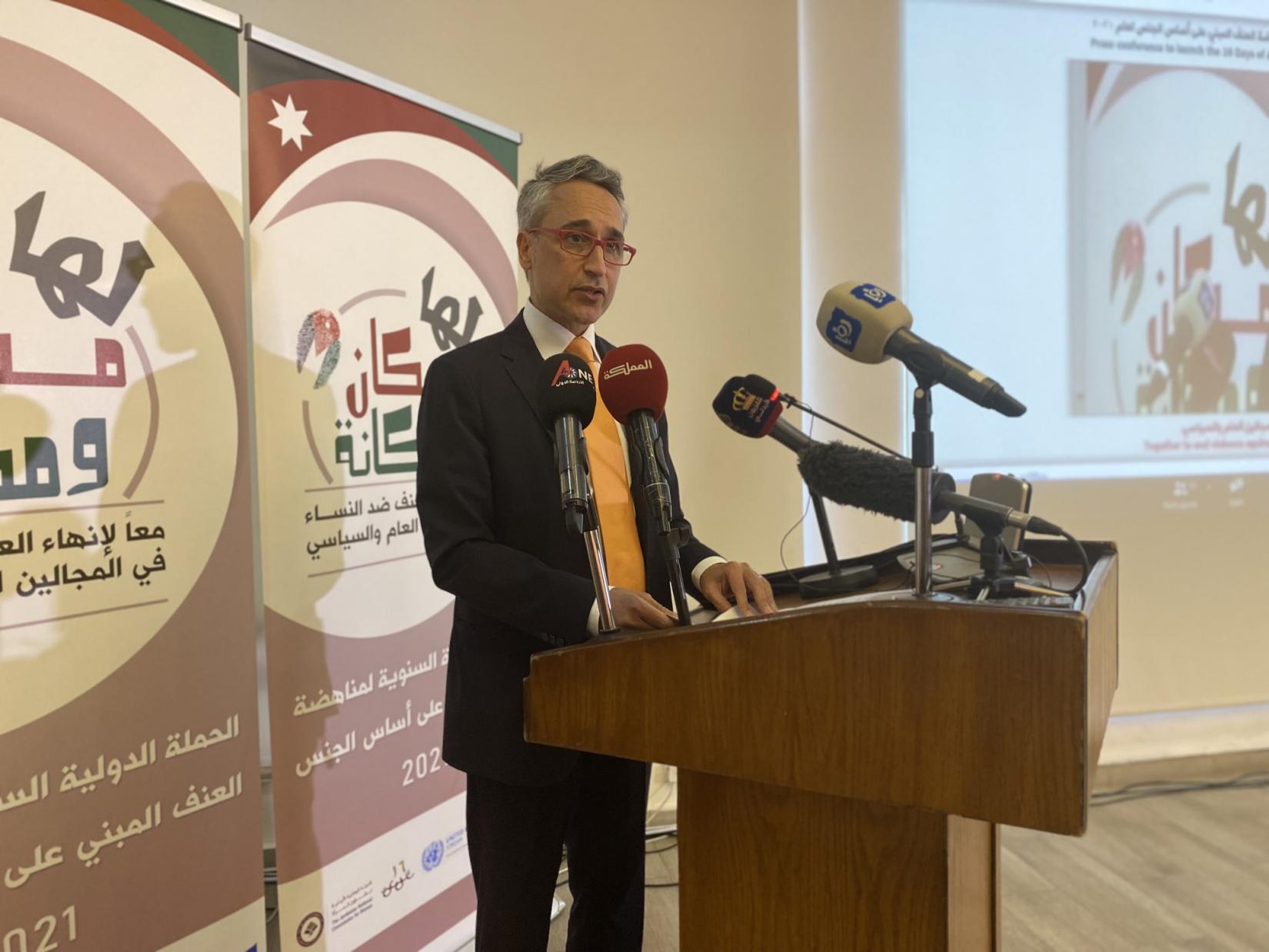Remarks by Mr. Ziad Sheikh RC/HC/DO a.i on the launch the 16 Days of Activism campaign
.

Excellency Wafaa Bani Mustafa, Minister of State for Legal Affairs,
Dr. Salma Nims, Secretary General of the Jordanian National Commission for Women,
Ms. Muna Abbas, Country Director of Plan International,
Distinguished partners and colleagues from civil society and the media,
I am pleased to be with you this morning on behalf of the UN family in Jordan.
To launch this year’s campaign against gender-based violence, the UN Secretary General made this unequivocal statement: he said, violence against women and girls continues to be the most pervasive and pressing human rights issue in the world today.
The world has seen the spike in gender-based violence during the COVID-19 pandemic. Women and girls have been – and continue to be – subjected to human rights violations with deep, long-lasting and far-reaching consequences. Their sense of safety has been eroded, causing severe negative impacts on their mental and emotional well-being.
Yet, violence against women is not inevitable. We must continue to believe – and to demonstrate – that positive change is possible. That with laws which are enforced, with an end to impunity, with partnerships and programmes which are adequately funded, change is possible. However, all of this is only possible if women’s leadership and voices are at the centre of understanding the issue and shaping the response.
This is the crucial nexus between women’s leadership and political participation and a country’s commitment and ability to challenge and eliminate the root causes of gender-based violence.
At an Expert Group Meeting co-convened by the UN and civil society in 2018, it was underscored that violence against women in politics is a human rights violation and a violation of women’s political rights. That women must be able to exercise those rights and bring their full value and contribution to public life wherein major decisions are made and major policies are shaped that impact whole societies.
During the same meeting, violence against women in politics was highlighted as a clear deterrent to women’s political participation, be it voting, running for or remaining in elected office. And that when women experience violence that keeps them from contributing to society, we all suffer that loss. And so it is neither productive nor accurate to view this as a women’s issue. Men must act to support women family members, colleagues, friends and leaders to challenge this violence. This is not only a matter of ensuring women’s human rights but also of recognizing that political systems benefit from the inclusion of women’s ideas and leadership.
Your Excellency, dear partners, colleagues and friends.
While this is not a new challenge, it has been further intensified. Recent research by the UN showed that nearly half (49%) of women internet users in the Arab States region reported not feeling safe because of online harassment. These feelings of fear and insecurity were more pronounced among women activists and human rights defenders (70%). And as a result, many women decided to exclude themselves entirely from online spaces. With shrinking spaces to share their ideas and concerns, women are further restricted in engaging with their constituencies and in gathering the support they need to participate and succeed in politics.
During this year’s campaign of activism against gender-based violence, the UN joins our national partners in calling for zero-tolerance to violence against women in politics. And we reaffirm our commitment as your partner to promote an enabling environment for women’s political participation:
- By investing in the collection, analysis and dissemination of gender data to inform evidence-based legislative reform and advocacy;
- By highlighting women’s participation as a whole of society issue and advocating for their equal representation in political life;
- By working with women elected to local governing bodies to raise awareness and understanding of violence against women in politics among local communities;
- By working with the media to spread messages on the critical role of politically active women;
- And by continuing to support the Government of Jordan’s efforts to strengthen violence prevention and response capacities and systems, and to implement measures to ensure a fair and equal playing field for women in politics.
The UN will also continue to work with civil society organizations who continue to play a key role in advocating for gender equality and women’s empowerment to be central to public decision- and policy-making.
Many events that will take place across Jordan to mark this year’s 16 Days of Activism Against Gender-Based Violence. Our shared objective must be that they reignite the urgency needed to eliminate this violence and to inspire others to join the cause.
Thank you.




